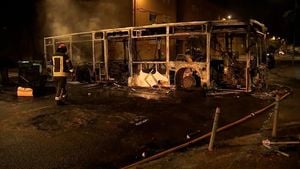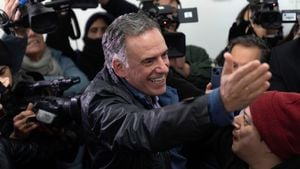On October 22, 2024, the Vatican announced the renewal of its controversial agreement with China, which governs the appointment of Catholic bishops within the country. This marked the third renewal of the deal since its inception in 2018, yet it continues to be shrouded in secrecy, leaving many questions about its efficacy and moral standing.
The agreement has sparked criticism, particularly as it coincided with the release of a report by the Hudson Institute, which detailed egregious cases of persecution faced by ten Catholic bishops across China. This report indicates a troubling trend: since the Sino-Vatican deal was first signed, religious persecution has intensified.
Many view the Vatican's decision to renew the agreement, which lacks transparency and public scrutiny, as puzzling. Observers have noted the absence of any criteria for review or conditionality surrounding the continuity of the deal, which raises eyebrows about the fidelity of its intentions. Some scholars and critics are questioning what exactly is at stake and what the Vatican may be trying to salvage with this notorious arrangement.
The issues surrounding the deal are multifaceted, but four principal concerns stand out. Firstly, the text of the agreement has remained entirely confidential, frustrating any hope for clarity or accountability. Renewed three times without public disclosure—most recently for four additional years—it begs the question: if the terms are beneficial, why aren’t they public?
Secondly, critics argue the agreement grants the Chinese Communist Party (CCP) undue influence over the appointment of bishops, effectively sidelining individuals who have remained loyal to the Vatican. This irony is not lost on those who see it as a betrayal of the underground Catholic Church leaders, who faced persecution for their allegiance to Rome. Observers claim this has worsened the existing divides between state-approved congregations and underground communities.
The agreement is regarded as having contributed to the Vatican's silence on human rights violations within China. Pope Francis, known for voicing global injustices—from humanitarian crises to war atrocities—seemingly refrains from commenting on the plight of Christians, the Uyghur genocide, or issues surrounding Tibet and Hong Kong. The absence of any words from the Vatican concerning the harassment faced by advocates for freedom also adds to the growing concerns about complicity.
Finally, the palpable distrust of the Chinese government plays heavily on the minds of many critics. Historical evidence suggests agreements with Beijing are often disregarded, as seen prominently with the dashed promises linked to Hong Kong. The use of agreements for bargaining often appears to serve the interests of the CCP rather than fostering genuine dialogue.
Despite the Vatican’s announced intentions behind the deal, which many assume include the ultimate aims of promoting religious freedom and safeguarding the Church, the outcomes have largely belied those aspirations. Reflecting on the last six years of the agreement, the trend points to increasing repression.
A significant number of bishops detailed by the Hudson Institute have had their situations degrade since the inauguration of the agreement. The report uncovers alarming cases of detention without due process, forced disappearances, and continual surveillance affecting these bishops. Notable names include Bishop James Su Zhimin, who has been subjected to secret detention for nearly three decades, and Bishop Augustine Cui Tai, who faces similar fates.
More heartbreaking is the case of Cardinal Joseph Zen from Hong Kong, who, though not detained, has faced legal threats for his active advocacy. His recent arrest has been seen as part of the broader crackdown on those who dare speak against the regime. Scholars and advocates alike express disbelief at the Vatican's failure to leverage such cases as leverage during the negotiations with China.
The conditions surrounding the renewal have prompted many to urge the Vatican to reassess its current China policy seriously. Diplomacy, reconciliation, and open dialogue are laudable objectives; yet, they must be implored through ethical frameworks rather than blind compliance with authoritarian regimes.
The growing denunciations from both international human rights organizations and groups of democracies have cast the Vatican’s decision to renew the agreement under stark scrutiny. The catch-22 between diplomatic protocol and moral integrity leaves many Catholics disillusioned as their leaders remain complicit by association.
Critics argue the Vatican must not shy away from its responsibility toward the Christian communities at the mercy of the CCP’s repressive state. Echoing the teachings of the Second Vatican Council, particularly Dignitatis Humanae, they remind Church officials of the fundamental duty to stand against any regime attempting to co-opt faith and impose sin on others.
With renewed calls for transparency and accountability surrounding this controversial agreement, observers and concerned parties advocate for the necessity to speak out against such diplomatic appeasements. While the Vatican’s hopes for reform are acknowledged as noble, evidence suggests it is veering dangerously close to enabling practices typical of the regime.
Against this backdrop of candid criticism and heart-wrenching accounts of persecution, many within the church community are left pondering what lies next for the Catholic faithful in China. The complex web of negotiations and political entanglements serves as both the canvas and the battleground for religious freedom—signifying the dire need for clarity and justice.



